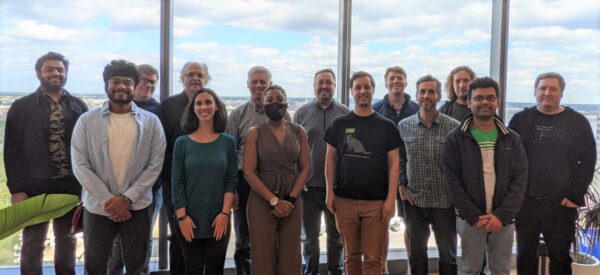Sponsored by Monday Properties and written by ARLnow, Startup Monday is a weekly column that profiles Arlington-based startups, founders, and other local technology news. Monday Properties is proudly featuring 1812 N. Moore Street in Rosslyn.
All eyes — and phones — are trained on the rollout of 5G.
The next generation of mobile internet service promises higher data rates, meaning more people will be able to access the internet simultaneously and enjoy, among other things, higher quality videos and faster download speeds.
Telecommunications companies can either buy new, custom 5G hardware or install 5G servers on existing cell phone infrastructure. Many companies are opting to use servers because they are cheaper and more flexible than buying hardware, according to Jim Shea, the co-founder and CEO of the Rosslyn-based startup DeepSig (1201 Wilson Blvd).
How these servers run, however, could be improved, Shea said.
His startup is looking to make these servers run smarter, not harder, using machine learning, or artificial intelligence (AI). DeepSig is currently testing a solution, which would be a simple software upgrade for these servers, in its Rosslyn lab.
The software could have political and environmental consequences for the rollout of 5G, Shea said. It is a goal DeepSig has been working toward since it was founded four years ago.
“I call this the inflection point,” he said.
DeepSig has been working with a number of government organizations and private companies, trying to raise enough money to launch the lab and hire the staff needed to develop this smart software. It finally launched the lab in March.
“We’ve been building toward this,” Shea said. “It takes a long time, but once you can prove your product is valuable, you can scale rapidly. This lab is key to us getting our tech out there.”
Currently, phones are constantly seeking a good cell connection and telling local wireless network hubs, called “base stations,” when the connection is bad. In that case, the base stations may increase power to improve the signal quality.
Using DeepSig’s software, the 5G servers will repurpose the information coming from cell phones to understand the station’s surroundings and what may impact signal quality.
For example, Shea said near his WeWork office, the cell signal bounces off Rosslyn’s tall buildings. Using AI, the 5G server could learn how the signal interacts with buildings and harness these patterns to improve signal quality without having to resort to ramping up the power.
“That’s what we’re proving out with the AI lab,” Shea said. “We know of large industrial partners who are excited about our tech. By June or July, we’ll be making calls through our labs and inviting people to come and see the tech at work.”
The software improves the 5G server’s performance without ramping up the power, which Shea said is better for the environment.
“Everyone’s worried about global warming,” he said. “Our software reduces energy consumption.”
Ultimately, Shea said the goal is to also get DeepSig’s technology embedded into American-made 5G hardware.
Currently, American mobile providers can choose from three of the four major hardware providers, all outside of the U.S.: Finland’s Nokia, Sweden’s Ericsson or South Korea’s Samsung. (Telecom companies cannot work with the Chinese company Huawei over data privacy concerns.)
Shea said DeepSig’s tech will help make American-produced hardware competitive in the marketplace.
“The problem in the U.S. is that we don’t have a domestic [5G] industry,” he said. “We hope to be part of the group that gets the U.S. to rehome this technology back here. There’s a lot of interest in the government to get that to happen.”
Photo courtesy DeepSig



